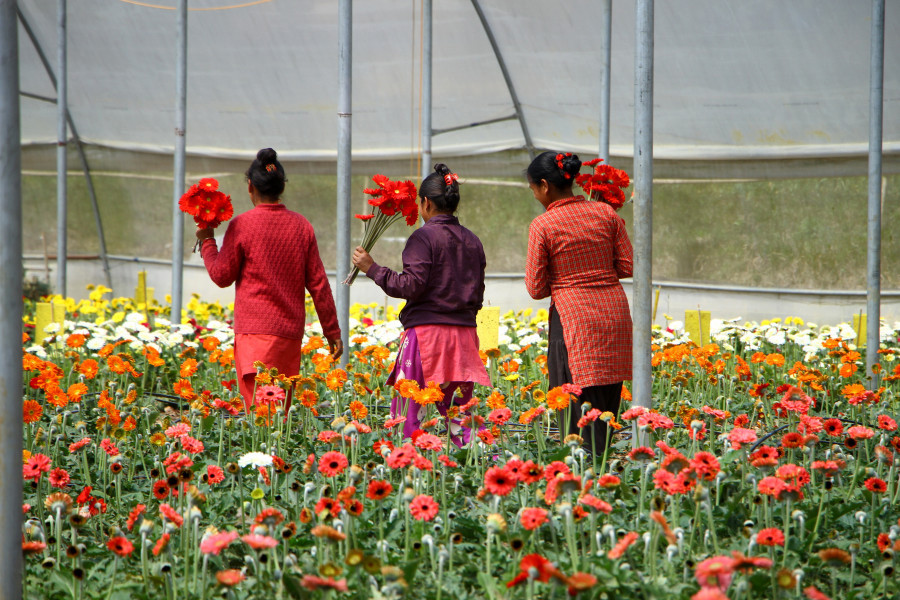Money
Small business owners say they never see budget funds
Allocations are announced for cottage, small and medium entrepreneurs every year but nobody knows where the money goes, insiders say.
Krishana Prasain
Flower grower Pandab Shrestha says the government has been allotting funds for cottage, small and medium entrepreneurs in the budget every year, but he has never seen a penny of it during his 13 years in the business.
“The Prime Minister Agriculture Modernisation Project gets a good budget allocation annually, but I do not know where the money goes as it has never come to us,” Shrestha told the Post after listening to the budget statement for the fiscal year 2021-22 on Saturday.
“The farmers who are doing commercial farming have never benefited from the allocated budget under the project,” said the owner of Srijana Cut Flower based in Ramkot.
Cottage, small and medium entrepreneurs do not expect this year's budget, which has been issued through the ordinance route, will be implemented, just like last year's failed budget. And they do not expect to be able to rebuild their businesses which have been knocked out by the pandemic.
Umesh Prasad Singh, acting president of the Federation of Nepalese Cottage and Small Scale Industries, said that the government did not provision any new programmes through the budget to address the sector amid the pandemic, and continued the programmes of the current fiscal year.
"The implementation part of the budget for the fiscal year 2020-21 was weak," he said. “We are sceptical regarding the implementation of the budget for the upcoming fiscal year too with the country going through political uncertainty. We do not expect much from this government either,” he said.
"The budget has failed to address the overall micro, cottage, small and medium enterprises sector. The government had announced a loan waiver for small and medium enterprises in the current fiscal year, but it was not implemented," Singh said.
“Only 2-5 percent of the micro, small and cottage entrepreneurs benefited from the refinancing facility provided by the government in the current fiscal year. And they had to face tremendous paperwork hassles with commercial banks ignoring their loan applications,” he added.
According to Singh, 25 percent of the micro, cottage, small and medium enterprises have shut down with 50 percent of their workforce becoming jobless.
The government has earmarked Rs13 billion in the budget for the fiscal year 2021-22 to provide concessional loans at 5 percent interest to micro, small and medium enterprises, commercial agriculture, youth enterprises, women enterprises and persons returning from foreign employment. The government in the upcoming fiscal year will be expanding the limit and scope of concessional loans.
“As businesses have been impacted by the coronavirus, we had asked for concessional loans at 2 percent interest, but it did not happen,” Singh said.
The government had allocated Rs50 billion in the 2020-21 budget to provide loans at 5 percent interest to cottage, small and medium enterprises and Covid-19 affected tourism businesses to pay their staff salaries. The fund was operated through Nepal Rastra Bank and the money was made available by the government, public enterprises and donor agencies.
Provisions were also made in the 2020-21 budget to provide refinancing facility of about Rs100 billion through Nepal Rastra Bank at a concessional interest rate of up to 5 percent to agriculture, cottage, small and medium industries, businesses, factories and tourism businesses hit by Covid-19.
The budget for the upcoming fiscal year 2021-22 has provisioned a bonded warehouse facility for the private sector to establish and operate export houses to increase the export of goods produced by small and medium enterprises. The production and export of ready-made garments, pashmina, carpets, jute, silk and cotton-based export-oriented goods will also be promoted.
The budget for the upcoming fiscal year has given continuity to the professional continuity fund established for the payment of wages of employees working in domestic, small, medium and large-scale industries.
The production of goods based on local raw materials and labour will be increased by protecting domestic, and small and medium enterprises. Provisions will be made to organise virtual trade shows using the internet to market the products of such firms.
E-commerce has been growing steadily in Nepal, but because of lack of proper linkage between e-retailers and producers, many homemade goods produced by small and medium-sized enterprises do not find a market even though they provide a livelihood for many families. Hardly 10-15 percent of homemade goods are showcased on online marketplaces, entrepreneurs said.
Due to the lockdown restrictions imposed in many parts of the country, entrepreneurs are having a hard time, and only a few micro, small and cottage industries are in operation.
A survey conducted of 37 businesses by the Ministry of Industry, Commerce and Supplies from November 2 to December 1 last year revealed that 75 percent of the small and micro enterprises in the country have shut down. Micro, cottage, small and medium-scale firms ran out of cash which resulted in many people losing their jobs, the report said.
The report showed that 76.47 percent of the micro and cottage industry firms faced problems in accessing raw materials and labour while 88.24 percent of the firms could not market their production.




 8.59°C Kathmandu
8.59°C Kathmandu














